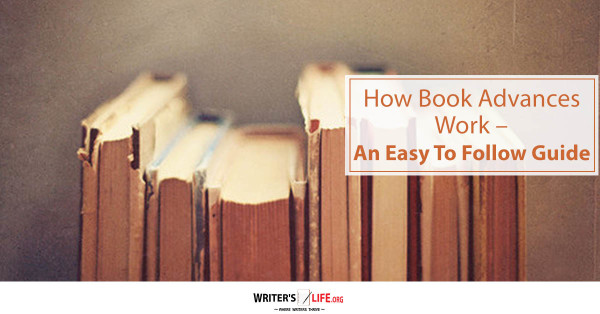- How To Tackle Jealousy In Creative Writing
- Common Submission Mistakes
- How To Stop Your Blog Becoming Boring
- The One Thing Every Successful Writer Has In Common
- How To Make Yourself Aware Of Publishing Scams
- Why Almost ALL Writers Make These Grammar Mistakes At Some Point
- 5 Tips For Authors On How To Deal With Rejection
- Top Mistakes to Avoid When Writing a Novel
- How to Avoid Common New Writer Mistakes
- 10 Mistakes New Fiction Writers Make
How Book Advances Work – An Easy To Follow Guide

Being accepted by a publisher or literary agent is incredibly exciting, and a dream come true for many writers. However whether you are new to the process, or have had work published before, you will soon realise that discussions about rights, contracts, royalties and advances can end up taking the wind out of your sails. Most writers don’t have a clue how it all works, but ensuring you negotiate the best and most profitable deal is really important. If you are in a position where your work is going to be published, it is good to have a firm grasp on what to expect, what reasonable percentages for commission are, the logistics of royalty payments, what realistic sums for an advance are, and any hidden clauses to keep to eye out for in your contract.
Making money
Let us first look at how writers make their money. When you sign a contract with a publisher you sign over certain rights which restrict you from trying to get it published elsewhere. It may be that the publisher wants worldwide rights, or just in certain territories -look out for this in your contract and make sure you are clear on what it all means.
Once the contract has been agreed, writers are usually paid either by way of a flat fee, which is a lump sum of money that is yours to keep. No royalties are included however, which means if the book becomes a global sensation you will not benefit, and the amount you are paid remains static. A second option is to get paid in royalties. If you get paid in royalties you will receive an agreed percentage of money for each book sold. This can be fantastic if you believe your book will sell lots of copies, but of course if it doesn’t, you may end up making next to nothing on your book.
The third, and probably most desired option is the advance against royalties, where an author receives a lump sum, as well as a percentage of the book sales, should it do well. The author will only begin to receive the royalties once sales of the book surpass the lump sum already given.
Happily the advance against royalties is the most common contract type. This means if your book doesn’t do well you still get the lump sum, regardless of whether you ever sell enough copies to surpass it, and if you do, you will then make an unlimited additional income through the royalties on future sales of your book.
What can I expect from royalties?
The percentage of royalties you get from each sale of your book can vary greatly dependant on a number of factors. Most publishers will take into account the cost your book has taken to produce, a hardback novel with a strong plot, that is likely to appeal to a wide audience may get around $3 per copy. A unique but niche non fiction work about a specific event, hobby or item, will see the author receive around $1 per copy sold. If you have included lots of pictures in your book, these are expensive to reproduce and therefore will see the percentage drop further.
What can I expect from my advance?
An author offered an advance is in a highly privileged position. However it is difficult to predict how much a publisher will be wiling to pay you before they have even put your book on the market. Of course they are experts in the industry, and so will have a good idea of how many copies they expect to sell. If they believe your book will do well they are likely to offer a larger advance. However remember that being offered a huge advance doesn’t always work in your favour. If you book doesn’t do as well as expected and the publisher ends up loosing money, they will be very reluctant to take on any of your future work.
Advances can range form a few thousand dollars up to millions (though this is extremely rare). You can negotiate your advance, however you must accept that a publisher is not going to risk paying out huge amounts of money on a book if they can’t be very confident they will make a return on it,
When will I receive the advance money after signing a contract?
Usually an advance is split into several lump sum payments. This is to protect the publisher and ensure you complete your manuscript to a required standard, within a required timeframe.
How can I be sure that my contract is fair?
Unless you have a thorough understanding of how contracts work and feel confident in your ability to manage and negotiate them, often the best advice is to get someone to handle this for you. Acquiring a literary agent to handle all the paperwork and negotiations can save you a lot of time, and you can rest assured the will try to get you a great deal - the downside is of course that you will have to pay them a commission too.
A financial advisor or lawyer can help you understand all the terms of the contract so hiring one to talk you through this on a as and when basis could be the best route for you to ensure you are getting paid properly and will make money if your work becomes extremely successful.
If you find yourself in the enviable position of having more than one publisher interested in you, be sure to read their proposals thoroughly. While it may be tempting to simply go with the highest bidder, it is likely if you are in this position that your book has real potential to do well. Make sure the publisher has a solid marketing plan for your book to ensure the most sales possible.
Understanding money when it comes to publishing your work can be tricky, however by using the above points as a guide you should avoid any nasty surprises, and enjoy making a decent profit from your work.






























